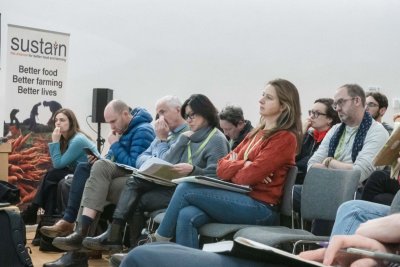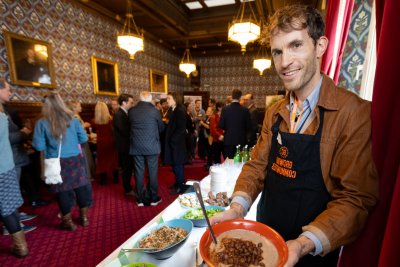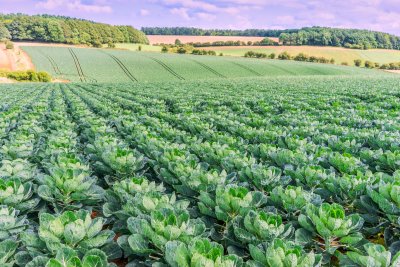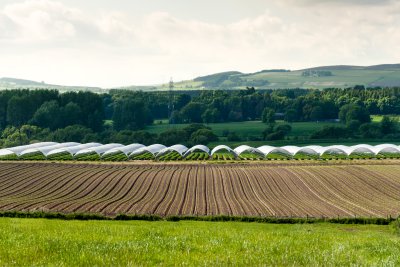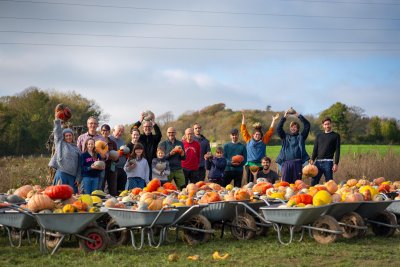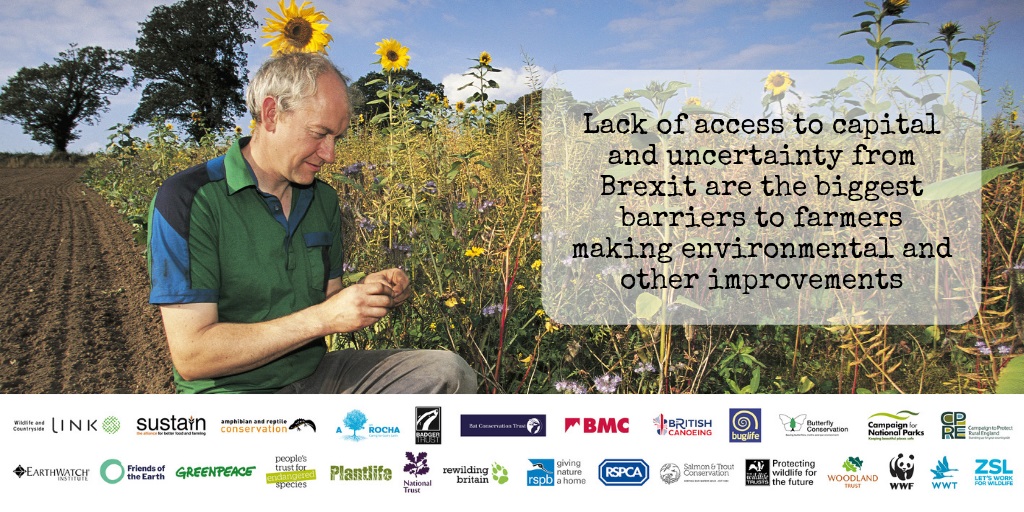 Credit: WCL
Credit: WCL

Saving the environment is more important to farmers than subsidising food productivity - reveals new research
Sustain were one of 26 organisations supporting a new survey of farmers which revealed that a healthy environment is a key business asset for four out of five farmers. It also showed that a third aren’t taking environmental action and that lack of access to capital, a harsh market, and uncertainty over Brexit are big barriers. Farmers and nature experts are united in a call to the Government for an ambitious agriculture policy which must have the environment at its heart.
A major survey of farmers’ attitudes to changes in the Government’s agricultural policy [1], shows that English farmers recognise the need for the environment and animal welfare to be prioritised in future Government policy, and acknowledge the key link between a thriving natural world and successful farming. The in-depth research showed 80% of farmers believe the health of the natural environment is important or very important for their farm business.
Pollution prevention is rated by most farmers as deserving Government funding in future farming policy, with more than half of farmers (56.2%) believing that activities which prevent pollution should be supported. Animal welfare (50.4%), habitat restoration (41%) and biodiversity conservation (38.2%) all ranked more highly than food productivity and competitiveness, which 38% said should be prioritised. Soil conservation and protection of crop, tree, plant and bee health were ranked closely behind at 37.2% and 35.0% respectively.
Further key findings from the independent research with 500 farmers, carried out on behalf of environment and animal welfare charities, reveal that:
- Two thirds of farmers say regulation is important or very important to protect standards in the farming industry. This is particularly significant considering over 90% of respondents class themselves as ‘conventional’ or ‘high-input’ farmers
- Half (50%) of farmers agree with the principle of ‘public money for public goods’ (one third are neutral, and one in five disagree with the principle). Younger farmers are the most supportive with 56% in favour and only 15% against public money for public goods.
- Increased weather volatility, e.g. flood and drought caused by climate change, is the second most commonly reported problem facing farmers (affecting 40%), second only to increased costs and reduced profit margins (affecting 51%). Weather volatility is hitting horticulture (75% affected) and arable farmers (51%) the hardest.
- A third of farmers are currently taking no environmental action to deal with problems on their farms, 44% are undertaking one or two environmental activities, one in five are undertaking three or more
- Farmers cite lack of access to capital and uncertainty caused by Brexit as by far the biggest barriers to making environmental and other improvements to their farm business (41% of farmers experienced lack of funds access and 41% are struggling to make changes due to Brexit)
Please see the research report and dataset for more detail and further findings.
Helen Chesshire, Senior Farming Advisor at Woodland Trust and Chair of Wildlife and Countryside Link’s Agriculture Group, said: ‘Farmers and conservationists are on the same page overall for the future of farming. Farmers are key guardians of our environment, and this research shows they know it is vital to our farming future to prioritise fixing the natural resources which farms rely on. With more than double the number of farmers in favour of public money for public goods than are against it, this research is a clear vote from farmers for keeping a strong environmental focus in future farming policy and legislation.’
Thomas Lancaster, Acting Head of Land Use Policy at RSPB, and Vice-Chair of Wildlife and Countryside Link’s Agriculture Group, said: ‘Farmers know fertile soils, clean water, pollinators and other natural resources, are essential to their businesses and they want to protect them. But this research shows lack of access to funds and uncertainty over the future, particularly around Brexit, are major barriers which are preventing farmers from doing more for our natural world. Farmers and environment charities are united in wanting certainty over future funding for nature-friendly farming This is key if both nature and farming are to survive and thrive.’
David Bowles, Head of Public Affairs at the RSPCA, said: ‘With animal welfare the second highest priority for farmers in future funding, the importance of animal welfare to farmers and their businesses is clear. Ensuring nationally that farmers are provided with financial support to rear their animals to higher welfare standards and keep them healthy is vital to establishing a healthy and sustainable food production system and must be recognised in law and Government policy.’
The Agriculture Bill, awaiting its next stage in Parliament, gives us a once in a generation opportunity to fix our broken farming system, a system which has incentivised unsustainable production for years. Putting the environment at the core of public funding for farming is key to delivering public goods, including: clearer air for us to breathe; cleaner water to drink; sustainable, responsibly-produced food to eat; and enhancing the treasured wildlife, plants and landscapes we all enjoy and want to access.
26 environment, access, and animal welfare charities [2] are therefore calling on the Government to:
- Ensure that public goods such as the environment, animal welfare and public access remain the central focus of the Agriculture Bill as it passes through Parliament.
- Deliver value for taxpayers’ money. Financial payments will be made to farms for both public goods and farming productivity. These must be complementary - moves to boost productivity must support environmental and welfare enhancements.
- Guarantee long-term public goods-based funding, giving farmers the certainty they need to invest in improving nature, animal welfare and public access
- Ensure strong, fair and properly enforced regulation that applies to all rural land managers, regardless of whether they receive public funding.
- Ensure farmers receive a fair return from the market for their produce, and the power of major retailers to influence farm-gate prices is used appropriately.
ENDS
FACTFILE:
- Pollinators: Three UK bumblebee species are extinct, and 7 have more than halved in 25 years. Butterflies nose-dived by 27% on farmland and 58% in woodland since 1990.Pesticides are more toxic and widely used - 55% of cereals were treated <4 times in 2016, compared to 30% in 1990
- Wildlife: More than half of UK species have suffered declines in recent years and almost one in six species (one in five mammals) are at risk of vanishing.
- Soils: Soil is being lost at 10 times the rate it is created, with around 2.9 million tonnes of soil lost from fields in England and Wales every year (Defra). Soil degradation costs the economy around £1.2bn a year including: reducing food production, increasing flooding and reducing water quality
- Water: Only 14% of rivers in England are classed as healthy. The highest proportion (31%) of pressures causing poor water health can be attributed to agriculture and land management
- Trees: Ancient woodlands support over 200 of our rarest and most threatened wildlife species, yet around half of our ancient woodlands have been lost in the past 90 years
- Hedgerows: 50% of UK hedgerows have disappeared since 1947 as a result of changes in farmland management, most that remain are in ‘poor condition’. Dependant wildlife has been severely affected by habitat loss with half of our hedgehog population having disappeared since 2000.
- Air: Agriculture accounts for 88% of ammonia emissions in the UK, contributing to wildlife loss and climate change, as well as damaging public health
- Landscape: Since only 1990, 60% of the English landscape has changed in ways which are ‘inconsistent’ with its traditional character, such as removing hedgerows, heathland, wildflower meadows, orchards and ponds.
1. This research was conducted by AgriSmart Limited on behalf of Wildlife and Countryside Link. AgriSmart is a member of the Market Research Society – all its research is conducted strictly in line with the Market Research Society code of conduct. All AgriSmart databases are subject to monthly TPS cleaning.
A sample of 500 farmers across England were surveyed between 1 November – 10 December 2018, through a combination of telephone and face-to-face interviews and written/online questionnaires. Responses were weighted according to up-to-date farm census data for England.
Please see Wildlife and Countryside Link’s breakdown of the research here and data spreadsheet here.
2. The following 26 organisations, co-ordinated by Wildlife and Countryside Link (the biggest environmental and animal welfare coalition in England), support these findings and calls to action: Amphibian and Reptile Conservation, A Rocha UK, Badger Trust, Bat Conservation Trust, British Canoeing, British Mountaineering Council, Buglife, Butterfly Conservation, Campaign for National Parks, CPRE, Earthwatch, Friends of the Earth, Greenpeace, National Trust, People's Trust for Endangered Species, Plantlife, Rewilding Britain, RSPB, RSPCA, Salmon and Trout Conservation, Sustain, The Wildlife Trusts, Woodland Trust, WWF-UK WWT (Wildfowl and Wetland Trust), and ZSL (Zoological Society of London).
Sustainable Farming Campaign: Pushing for the integration of sustainable farming into local, regional and national government policies.
Sustain
The Green House
244-254 Cambridge Heath Road
London E2 9DA
020 3559 6777
sustain@sustainweb.org
Sustain advocates food and agriculture policies and practices that enhance the health and welfare of people and animals, improve the working and living environment, promote equity and enrich society and culture.
© Sustain 2026
Registered charity (no. 1018643)
Data privacy & cookies
Icons by Icons8
